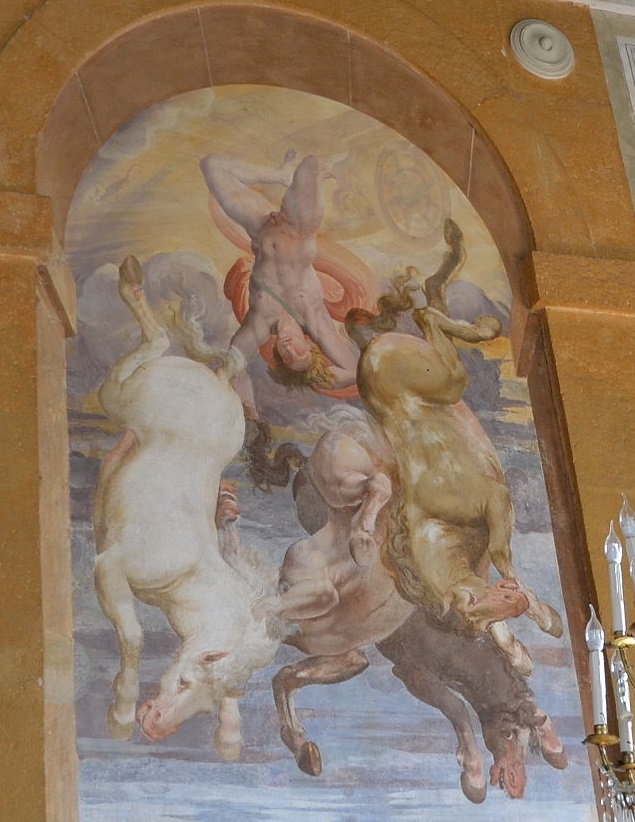I recently came upon this Latin phrase: Medio tutissimus ibis (You will go most safely by the Middle Way), and was intrigued. I looked it up, and found that it came from Ovid’s Metamorphoses. Ovid was one of the greatest Roman poets, and his Metamorphoses are treatments of various Classical myths around the theme of transformation. The quotation comes from the story of Phaethon, and it turns out that it has quite a lot of symbolic power as a story about the Middle Way.
The story goes that Phaethon was the unrecognised son of Phoebus (Greek Helios), the sun god who drove the chariot of the sun across the sky every day. On finding out from his mother that he was the son of Phoebus, Phaethon went to him asking for recognition. Phoebus agreed to grant him any favour he might ask, so Phaethon then demanded to drive the sun chariot across the sky for a day. Phoebus warned him about how difficult this was. The horses are difficult to control, and you need to follow a middle path to make sure the earth gets the right amount of heat. Deviating from that middle path could have disastrous consequences. But Phaethon insists. Here is the crucial passage where Phoebus advises Phaethon on his course.
Observe with care that both the earth and sky
have their appropriate heat—Drive not too low,
nor urge the chariot through the highest plane;
for if thy course attain too great a height
thou wilt consume the mansions of the sky,
and if too low the land will scorch with heat.
“Take thou the middle plane, where all is safe;
nor let the Wheel turn over to the right
and bear thee to the twisted Snake! nor let
it take thee to the Altar on the left—
so close to earth—but steer the middle course.—
to Fortune I commit thy fate, whose care
for thee so reckless of thyself I pray.
(Metamorphoses 2:137, trans. More)
It is “take thou the middle plane, where all is safe” that corresponds to the Latin phrase medio tutissimus ibis. There are a number of interesting aspects to this from the standpoint of the symbology of the Middle Way. Firstly, the middle course is three dimensional: not too high or too low as well as not too far to the left or right. Of course, the Middle Way is not any old middle course between any set of conventionally-define extremes, but the extremes given by Ovid seem to be of greater significance than that and so in many ways match up with those avoided by the Middle Way. If we consume the mansions of the sky, this could stand for appropriating the divine or the idea of the perfect and infinite. If on the other hand, we scorch the land, this can stand of absolutizing particular worldly goals and thus allowing our ambitions and ideologies to consume the world. The twisted snake may be associated with Asculapius, the god of medicine who was supposed to have been punished for taking medicine too far and reviving the dead. On the other hand, the Altar obviously has associations with religiosity. So the left and right extremes here could well be understood as standing for scientism on the one hand, which pushes science too far by drawing absolute conclusions from it, and religious absolutism on the other.
Like us, pushed into the world to try to follow a Middle Way, Phaethon is horrifically unprepared. He is a reckless and naïve youth who has neither the skill nor the wisdom to follow that middle course. The results follow in the rest of the story. Phaethon is unable to control the horses, and plunges to earth, where the fire of the sun starts to burn everything up (apparently producing the Sahara desert). The earth appeals desperately to Jupiter, who sends a lightning-bolt which destroys Phaethon and somehow stops the conflagration.
The Fall of Phaethon thus seems to be a potent symbol of the potentially disastrous consequences of veering from the Middle Way. By falling to earth he veers too far off the path downwards, giving way too much to narrow worldly goals and beliefs. The idea that this might destroy the world through heat can be a potent one for us today, given the threat of global warming, one of the effects of which are a greater threat of conflagrations and desertification, both mentioned by Ovid. This threat can be directly linked to our tendency to absolutise our desires.
Links:
Online translation of Ovid’s metamorphoses
Picture: Fall of Phaethon, mural in a Genoese villa, taken by Carlo Dell’Orto CCBYSA 4.0
